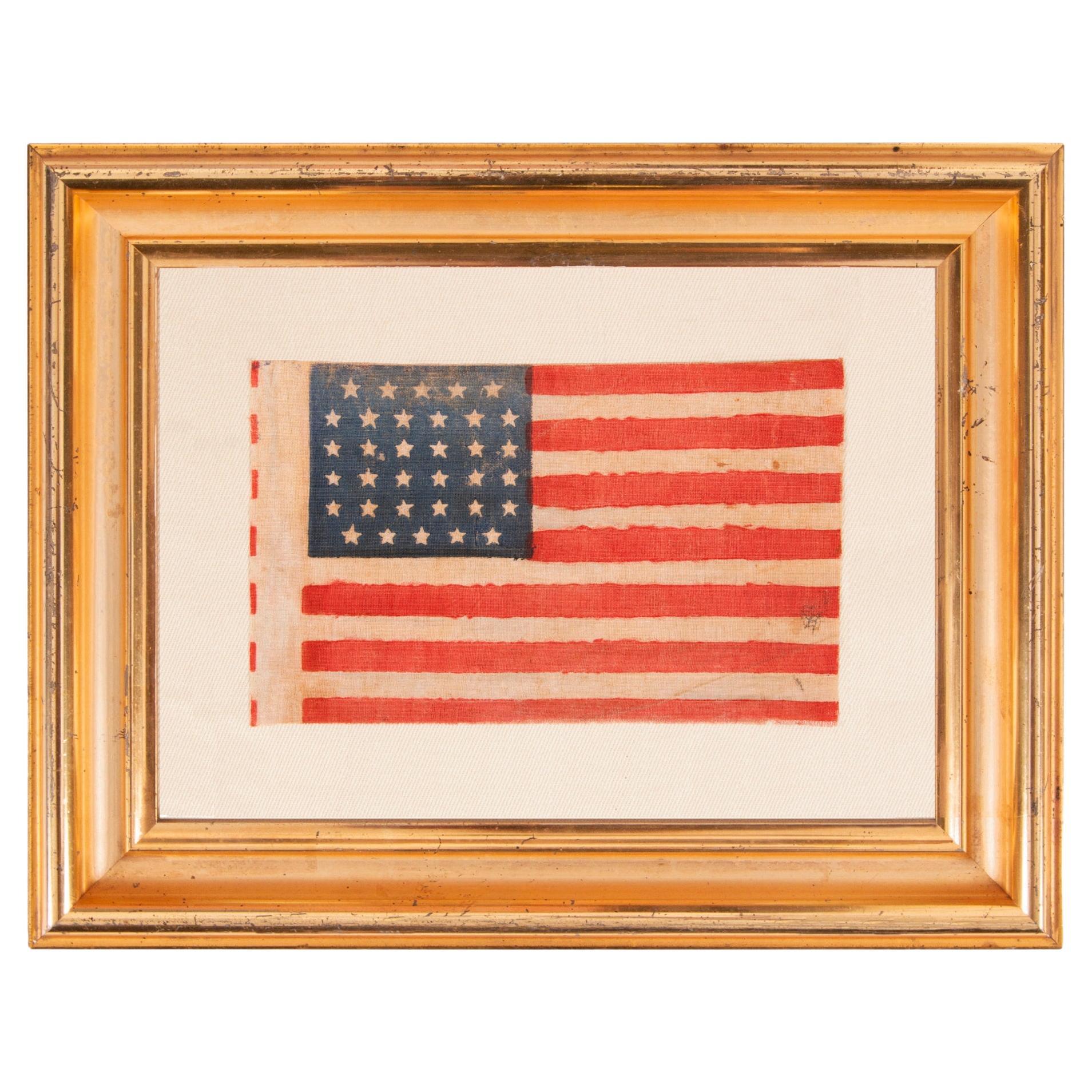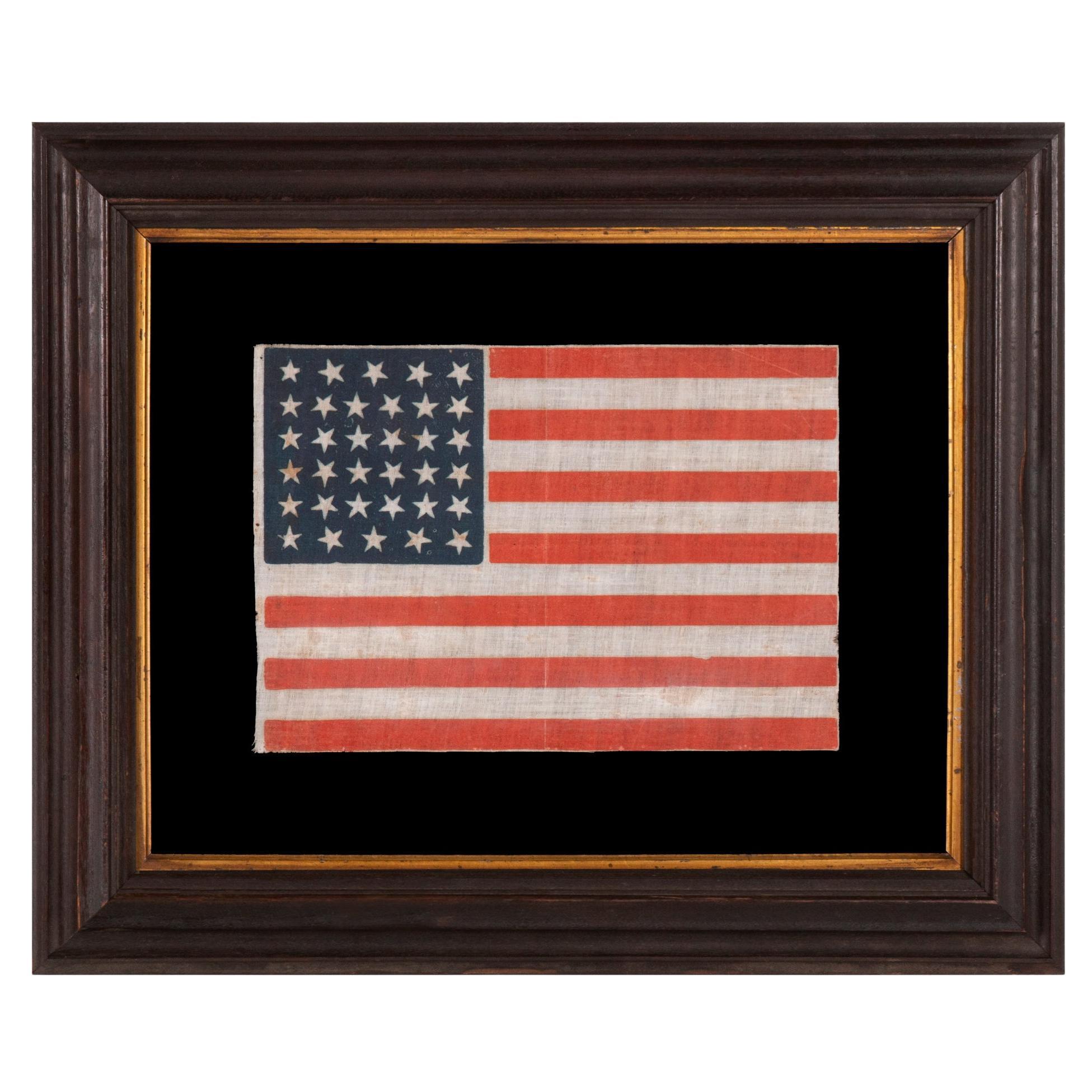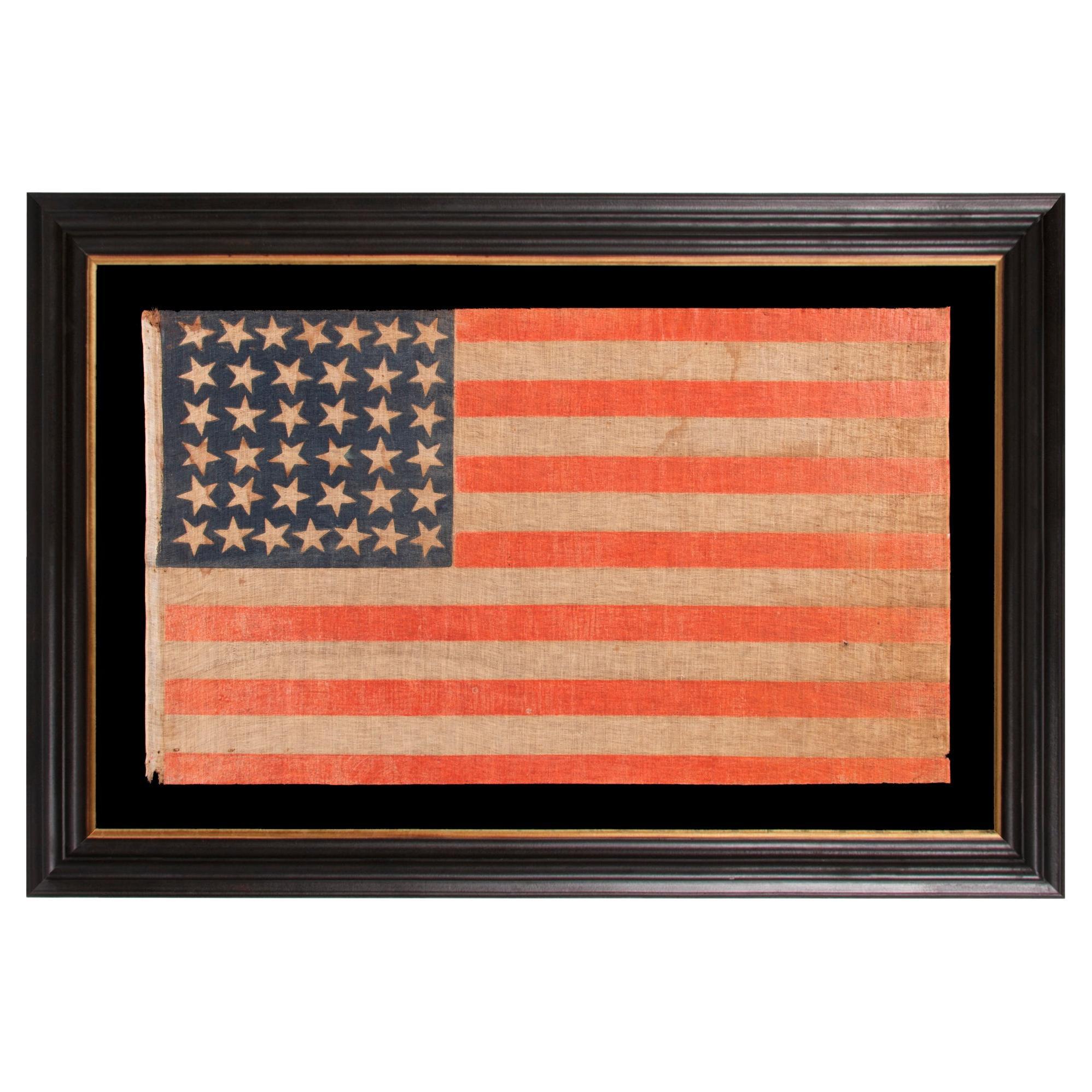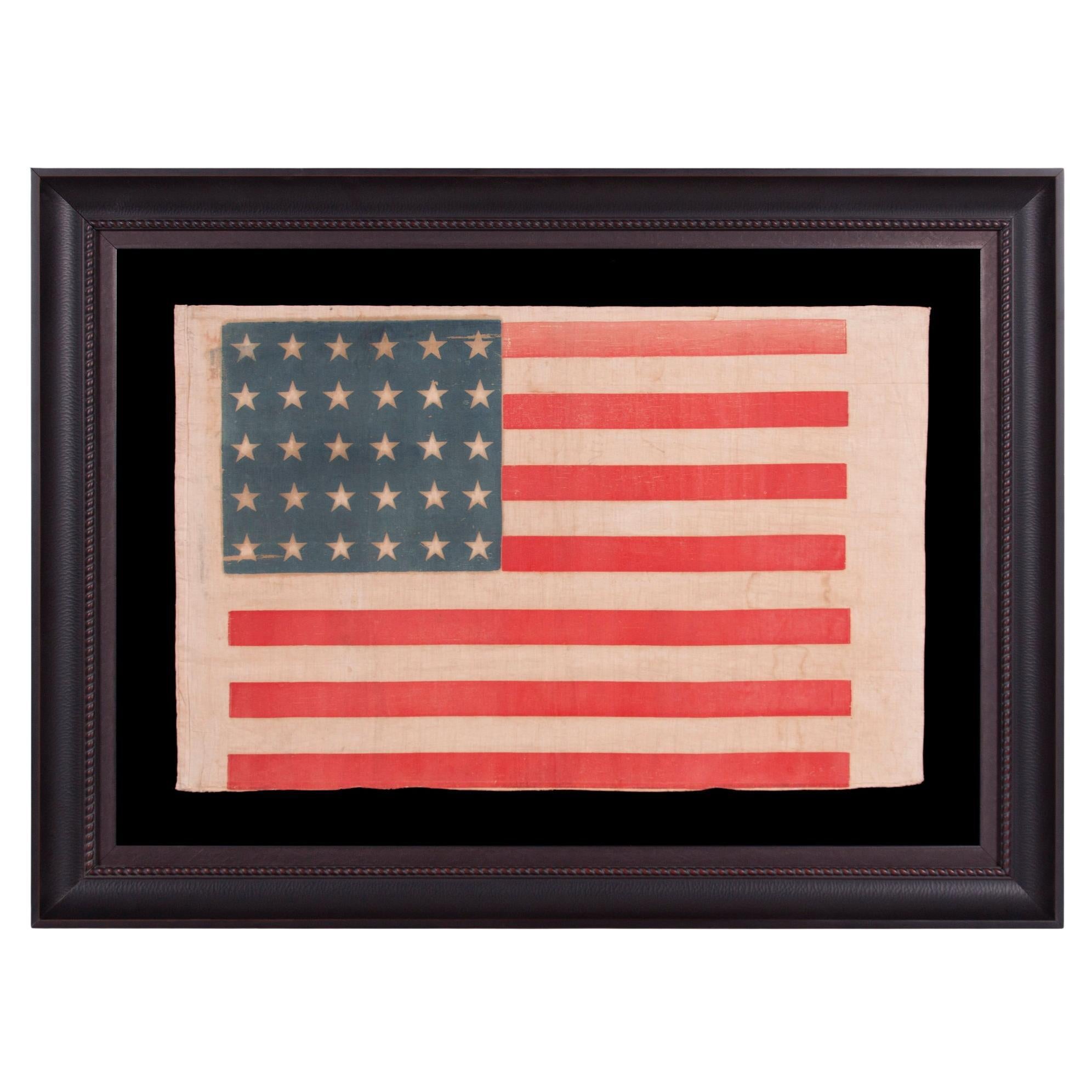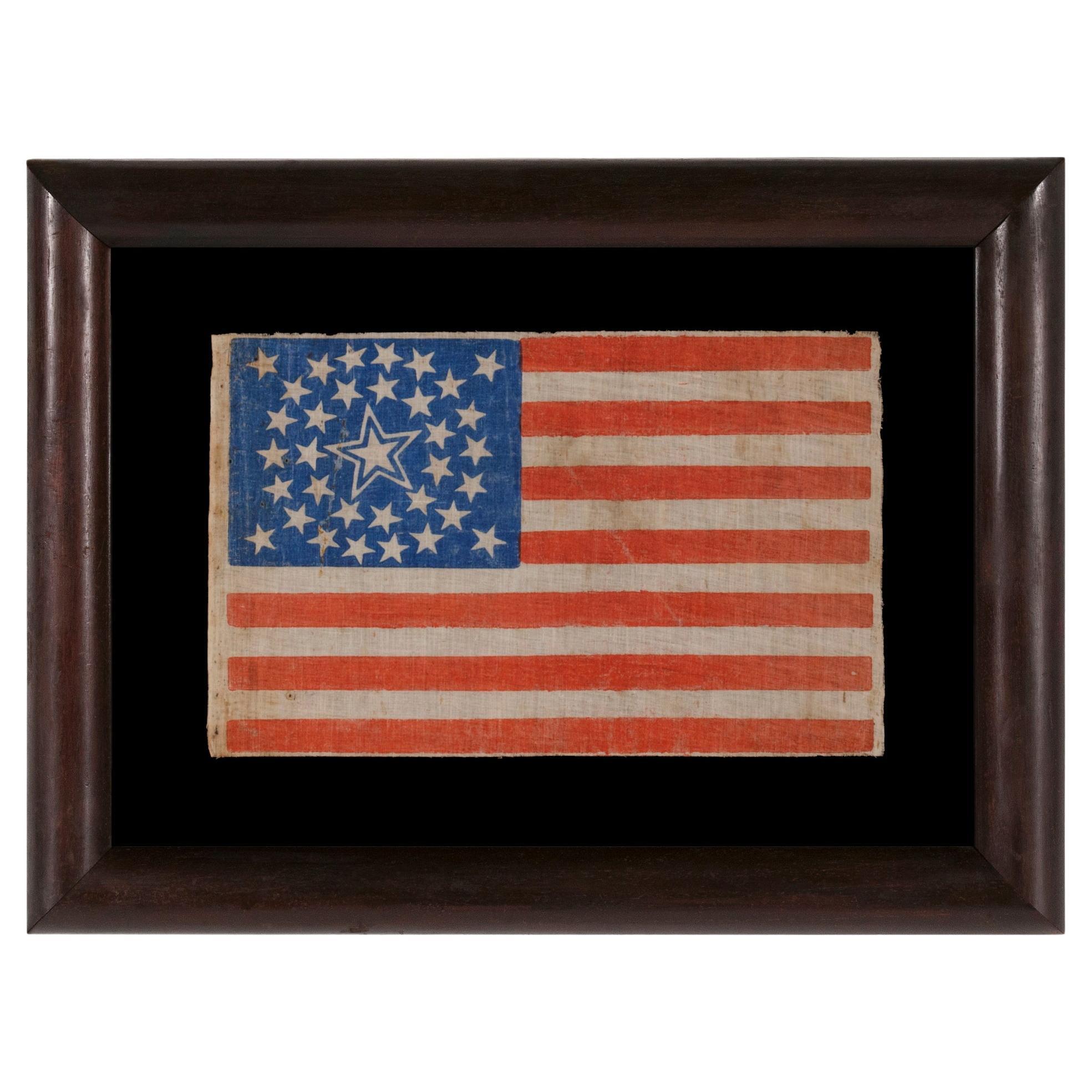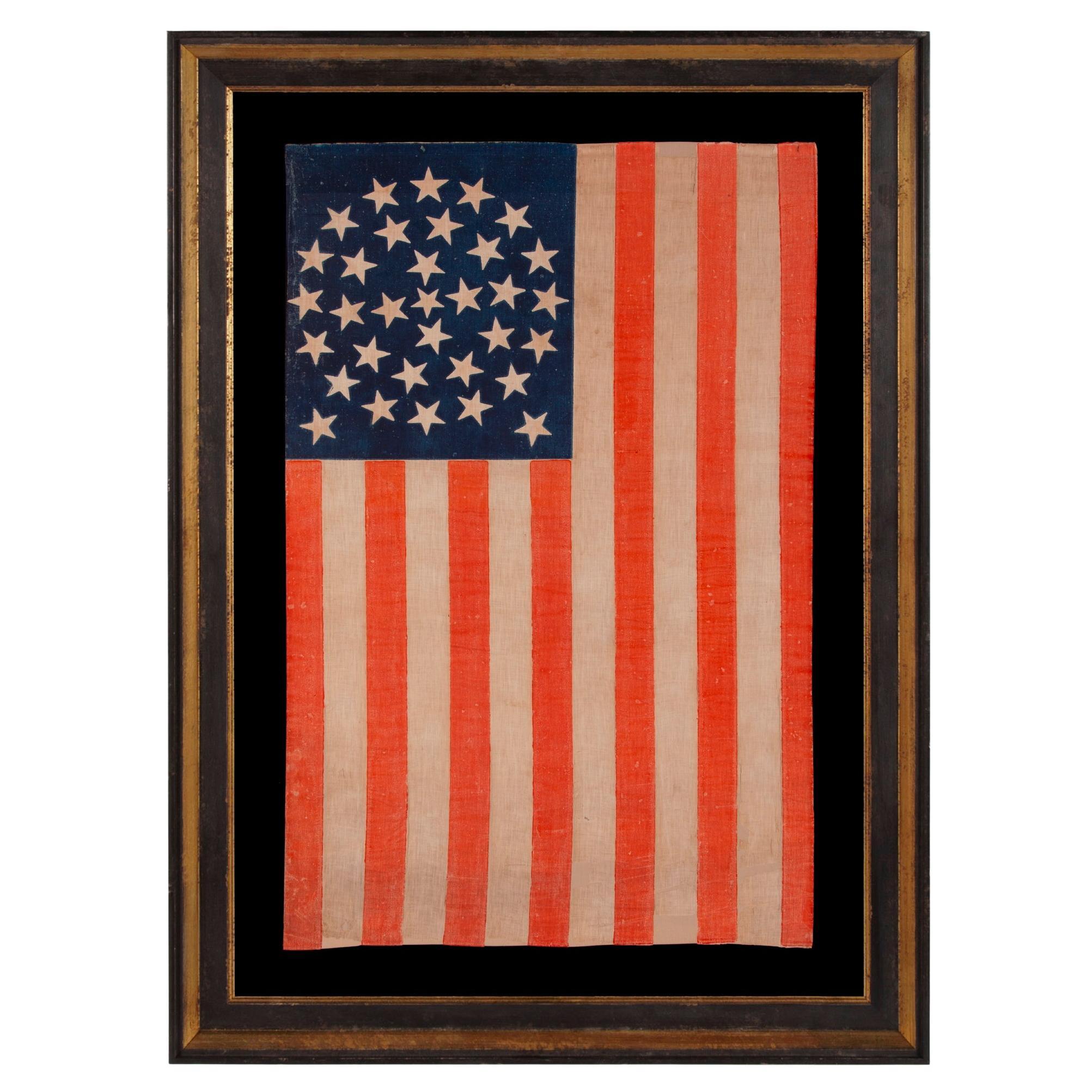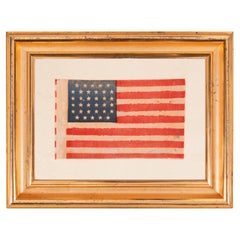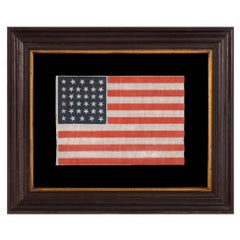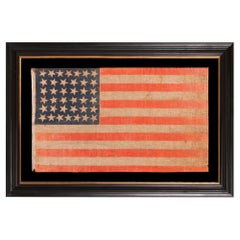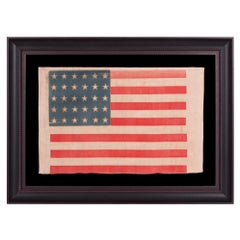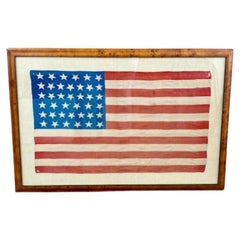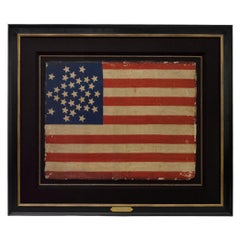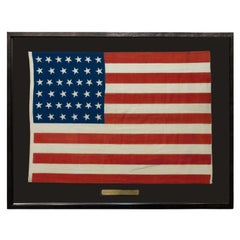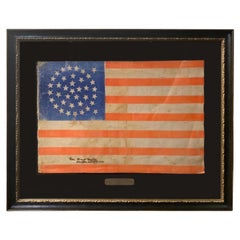Items Similar to 35 Star Antique American Parade Flag, West Virginia Statehood, ca 1863-1865
Want more images or videos?
Request additional images or videos from the seller
1 of 6
35 Star Antique American Parade Flag, West Virginia Statehood, ca 1863-1865
Price Upon Request
Price Upon Request
Price Upon Request
Price Upon Request
Price Upon Request
Price Upon Request
Price Upon Request
Price Upon Request
Price Upon Request
Price Upon Request
Shipping
Retrieving quote...The 1stDibs Promise:
Authenticity Guarantee,
Money-Back Guarantee,
24-Hour Cancellation
About the Item
35 STAR ANTIQUE AMERICAN PARADE FLAG WITH A DOUBLE-WREATH STYLE MEDALLION CONFIGURATION OF STARS, PERHAPS THE BEST SURVIVING EXAMPLE IN THIS RARE FORM, CIVIL WAR PERIOD, WEST VIRGINIA STATEHOOD, 1863-1865
35 star American national flag, block-printed on glazed cotton. The stars are arranged in circular medallion that consists of a large center star, surrounding by two wreaths of much smaller stars, with a flanking star, of an in between size, in each corner of the canton. Note the whimsical, folk qualities, present not only in the crude shapes of the stars themselves, but in their vertical alignment. Spun in various directions on their vertical axis, the canted position of the center star punctuates the flag’s intriguing graphics.
West Virginia joined the Union as the 35th state on June 20th, 1863, annexed from the upper west corner of Virginia to become a Free State, just 10 days before the Battle of Gettysburg. The 35 star flag became official on Independence Day of that year, one day after the battle’s conclusion. On the very same day, an event of equivalent importance took place in Mississippi, when Confederate General John C. Pemberton surrendered to Union General Ulysses S. Grant, as the city of Vicksburg fell in the heart of the Confederacy.
While the 35 star flag remained official until July 3rd, 1865, production would have ceased long before. Nevada became the 36th state on October 31st, Halloween, 1864, ushered in by Lincoln just 8 days before his reelection. The makers of American flags, both commercial and private, paid little heed to official guidelines with regard to official specifications, often adding stars before the respective states were even in, in hopeful anticipation of their arrival, or subtracting whatever number they felt were loyal to the Southern cause. Not wanting to produce flags that would soon be out-of-date, most flag-makers would have included a 36th star upon Nevada’s admission. This meant that 35 star flags were realistically produced for less than a year-and-a-half. Scarcity is one reason why 35 star flags are so interesting. Far fewer flags are known in this count than in the 34 star count that proceeded it, or the 36 star count that followed.
Among the 35 star parade flags known to exist in this particular style, this may be the best of all known examples, due to both its strong colors, with an interesting shade of ocean blue that contrasts beautifully with a vibrant sunfire red, and the grainy qualities of its printing, which is particularly appealing from the perspective serious collectors of Americana, who appreciate exceptional early surfaces on paint decorated objects. Because there was no official star pattern until 1912, the design of the American flag in the 19th century was left to the whims of its maker. The liberties afforded to Americans in the rendering of the Stars & Stripes during the 18th and 19th centuries explains some of them can be counted among the best examples of Early American folk art.
Mounting: The flag was mounted and framed within our own conservation department, which is led by expert staff. We take great care in the mounting and preservation of flags and have framed thousands of examples.
The flag has been hand-stitched to a background of 100% hemp fabric, ivory in color, with a twill weave. The gilded American molding dates to the mid-19th century. Spacers keep the textile away from the glass, which is U.V. protective.
Condition: there is modest-moderate soiling along the hoist, running into the last three white stripes and a bit into the Canton. There are a few tiny stains in the striped field, the most significant of which is in the 5th white stripe, about 2/3 of the way across. There is minor misprinting in the canton. Many of my clients prefer early flags to show their age and history of use.
- Dimensions:Height: 14.5 in (36.83 cm)Width: 18.25 in (46.36 cm)Depth: 2 in (5.08 cm)
- Materials and Techniques:
- Place of Origin:
- Period:
- Date of Manufacture:1863-1865
- Condition:See Item Description.
- Seller Location:York County, PA
- Reference Number:Seller: 35-0041stDibs: LU849740705602
About the Seller
5.0
Recognized Seller
These prestigious sellers are industry leaders and represent the highest echelon for item quality and design.
Established in 1991
1stDibs seller since 2008
70 sales on 1stDibs
Typical response time: 1 to 2 days
- ShippingRetrieving quote...Shipping from: York County, PA
- Return Policy
Authenticity Guarantee
In the unlikely event there’s an issue with an item’s authenticity, contact us within 1 year for a full refund. DetailsMoney-Back Guarantee
If your item is not as described, is damaged in transit, or does not arrive, contact us within 7 days for a full refund. Details24-Hour Cancellation
You have a 24-hour grace period in which to reconsider your purchase, with no questions asked.Vetted Professional Sellers
Our world-class sellers must adhere to strict standards for service and quality, maintaining the integrity of our listings.Price-Match Guarantee
If you find that a seller listed the same item for a lower price elsewhere, we’ll match it.Trusted Global Delivery
Our best-in-class carrier network provides specialized shipping options worldwide, including custom delivery.More From This Seller
View All34 Star Antique American Parade Flag, Kansas Statehood, ca 1861-1863
Located in York County, PA
34 STAR ANTIQUE AMERICAN FLAG WITH A LINEAL ARRANGEMENT THAT I HAVE TERMED "GLOBAL ROWS, WITH EXCEPTIONAL COLOR AND CRUDE YET BEAUTIFUL FEATURES, OPENING TWO YEARS OF THE CIVIL WAR, ...
Category
Antique 1860s American Political and Patriotic Memorabilia
Materials
Cotton
Price Upon Request
34 Star Antique American Parade Flag, Kansas Statehood, ca 1861-1863
Located in York County, PA
34 STARS, WITH SCATTERED POSITIONING, ON AN ANTIQUE AMERICAN PARADE FLAG MADE DURING THE OPENING TWO YEARS OF THE CIVIL WAR, 1861-63, KANSAS STATEHOOD
34 star American national flag...
Category
Antique 1860s American Political and Patriotic Memorabilia
Materials
Cotton
Price Upon Request
38 Star Antique American Parade Flag, Colorado Statehood, ca 1876-1889
Located in York County, PA
38 STAR ANTIQUE AMERICAN PARADE FLAG WITH JUSTIFIED ROWS OF 7-6-6-6-6-7 AND SCATTERED STAR ORIENTATION, MADE DURING THE PERIOD WHEN COLORADO WAS THE MOST RECENT STATE TO JOIN THE UNION, 1876-1889
38 star American national parade flag, printed on coarse cotton, possibly with flax content. One of the flag’s most interesting features is the wild sweep of the grain of the fabric, the warp and weft of which are anything but perpendicular.
The stars are arranged in justified rows of 7-6-6-6-6-7. This results in a secondary pattern that I commonly call a “box-in-a-box-in-a-box”, because of the way in which the seemingly haphazard arrangement creates three consecutive squares. Note how the stars point in various directions on their vertical axis, which adds a nice element of folk quality to the overall design.
Most parade flags in this star count have red stripes that lean heavily toward orange, with a vibrant, chromatic luster. This was common across printed flags produced between the 1850's and the 38 star period, phasing out in the last decade of the 19th century. Also note how the wear and patina contribute to an endearing presentation that displays its long-term use gracefully.
Colorado became the 38th state on August 1st, 1876. This was the year of our nation’s 100-year anniversary of independence. Per the Third Flag Act of 1818, stars were not officially added until the 4th of July following a state's addition. For this reason, 37 was the official star count for the American flag in 1876. In the latter 19th century, it became common to add stars before the respective state(s) had even entered the Union. No one cared what was official, not even the military, where the matter of practicality with regard to flags always seems to have outweighed regulations. In the private sector, commercial flag-making was a competitive venture. Few flag-makers continued to produce 37 star flags when their competitors had jumped the star count to 38. It is for this reason that 38 and 13 stars (to represent the original 13 colonies) are more often seen at the Centennial International Exposition, the six-month long World’s Fair, held in Philadelphia, that served as the nucleus of the national celebration.
Some makers of printed parade flags actually began to produce 39 star flags in 1876, in hopeful anticipation of the addition of two more Western Territories instead of one. The 39th state would not join the Union for another 13 years, however, when the Dakota Territory—thought to be coming as a single state—entered as two separate states on November 2nd, 1889. The 38 star flag generally fell out of production at that time, though it technically remained official until July 3rd, 1890.
President Ulysses S. Grant was in office when the first 38 star flags would have appeared. The list of presidents that served during the period when the 38 star flag was official include Rutherford B. Hayes, James Garfield...
Category
Antique Late 19th Century American Political and Patriotic Memorabilia
Materials
Cotton
Price Upon Request
30 Star Antique American Parade Flag, Wisconsin Statehood, ca 1848-1850
Located in York County, PA
ANTIQUE AMERICAN PARADE FLAG WITH 30 STARS, THE ONLY KNOWN EXAMPLE IN THIS SIMPLE BUT EXTRAORDINARY STYLE, PRE-CIVIL WAR, OFFICIAL FOR JUST TWO YEARS, REFLECTS THE ADDITION OF WISCON...
Category
Antique Mid-19th Century American Political and Patriotic Memorabilia
Materials
Cotton
Price Upon Request
34 Star Antique American Parade Flag, Kansas Statehood, ca 1861-1863
Located in York County, PA
34 STARS IN A MEDALLION CONFIGURATION ON AN ANTIQUE AMERICAN PARADE FLAG WITH A LARGE, HALOED CENTER STAR; CIVIL WAR PERIOD, KANSAS STATEHOOD, 1861-1863
34 star American national pa...
Category
Antique 1860s American Political and Patriotic Memorabilia
Materials
Cotton
Price Upon Request
33 Star Antique American Parade Flag, Oregon Statehood, ca 1859-1861
Located in York County, PA
33 STARS IN A MEDALLION CONFIGURATION ON A LARGE SCALE ANTIQUE AMERICAN PARADE FLAG, AN EXTREMELY RARE EXAMPLE, OREGON STATEHOOD, 1859-1861
This 33 star American parade flag, printe...
Category
Antique Mid-19th Century American Political and Patriotic Memorabilia
Materials
Cotton
You May Also Like
19th Century American 39 Star Flag, circa 1889
Located in Nantucket, MA
19th Century American 39 Star Flag, circa 1889, a period printed silk parade flag with a wavy pattern of dancing stars. This was never an official flag of the United States but was m...
Category
Antique 1880s American Federal Political and Patriotic Memorabilia
Materials
Silk
31-Star Printed American Flag, Celebrating California Statehood, Circa 1850
Located in Colorado Springs, CO
This is a rare 31-star medallion printed American flag, celebrating the addition of California to the Union. The flag is printed on silk and has a spectacular “Great Star” canton pat...
Category
Antique 1850s American Political and Patriotic Memorabilia
Materials
Silk
39-Star Antique American Flag with 'Whimsical' Star Pattern, 1889
Located in Colorado Springs, CO
This is a 39-star unofficial American flag, handmade and printed on cotton. The flag dates to 1889 and has a unique history, thanks to its rare star-count.
The flag’s canton is prin...
Category
Antique 1880s American Political and Patriotic Memorabilia
Materials
Cotton
38-Star American Parade Flag, Flown at a Reception for President Grant, 1880
Located in Colorado Springs, CO
This is a beautifully colored 38-star American parade flag, flown at a public reception for Ulysses S. Grant in October of 1880. This printed flag features a rare, triple medallion s...
Category
Antique 1880s American Political and Patriotic Memorabilia
Materials
Cotton
19th Century 39 Star American Flag, circa 1889
Located in Nantucket, MA
19th Century 39 Star American Flag, circa 1889, a printed linen ensign with 39 stars arranged in a wavy star pattern, with stripes in a very unus...
Category
Antique 1880s American Federal Political and Patriotic Memorabilia
Materials
Linen
39-Star Printed American Flag, Commemorating North Dakota Statehood, 1889-1890
Located in Colorado Springs, CO
This is a 39-star unofficial American flag, celebrating North Dakota statehood. The printed flag dates to 1889 and showcases a “whimsical” star pattern in the canton. The flag's cant...
Category
Antique 1880s American Political and Patriotic Memorabilia
Materials
Fabric
More Ways To Browse
Civil War Antiques
American West Antiques
Antique American Flags
Union Flag
Virginia 19th Century
Antique Virginia Furniture
Framed American Flags
19th Century American Flag
American Flag Cotton
Small American Flag
Antique American Flag Framed
Space Memorabilia
Gilded Age Antiques
Star Wars Prints
Antique Hemp
Antique Hoist
Confederate Art
Blue Star Flag
